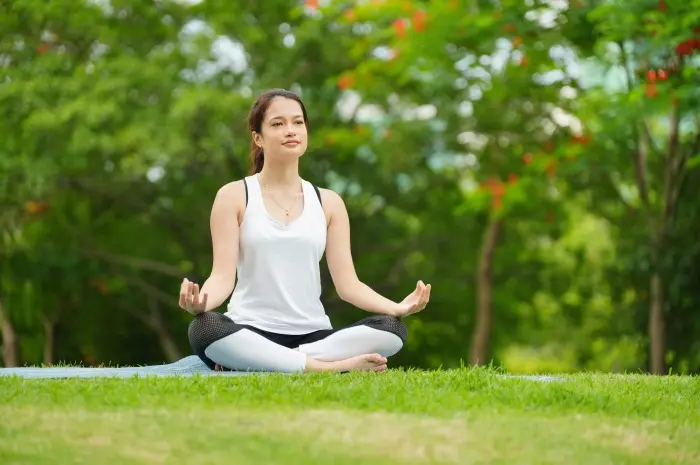Anxiety is a prevalent issue in modern society, affecting millions of people worldwide. It can manifest in various ways, including constant worry, physical symptoms, and a general sense of unease.
While there are many approaches to managing anxiety, meditation has gained significant attention as a natural and effective method.
With its roots in ancient practices, meditation involves techniques that focus the mind and promote relaxation, potentially offering relief from the persistent and often debilitating effects of anxiety.
As more individuals seek alternatives to medication and traditional therapies, the question arises: can meditation effectively reduce anxiety?
Research and anecdotal evidence suggest that meditation can be a powerful tool for calming the mind, reducing stress, and improving overall mental health.
This article explores how meditation works to alleviate anxiety, reviews scientific studies supporting its benefits, and provides practical tips for incorporating meditation into your daily routine.
1. Understanding Meditation and Anxiety
What is Meditation?
Meditation is a practice that involves focusing the mind, often through techniques such as mindfulness, deep breathing, or visualization.
The goal of meditation is to achieve a state of mental clarity, calmness, and emotional stability.
There are various forms of meditation, including mindfulness meditation, transcendental meditation, and guided imagery, each offering unique approaches to achieving mental peace.
The Nature of Anxiety
Anxiety is a mental health condition characterized by excessive worry, fear, and physical symptoms such as increased heart rate and muscle tension.
It can be triggered by various factors, including stress, trauma, and genetic predisposition.
Chronic anxiety can significantly impact quality of life, making effective management strategies essential.
2. How Meditation Reduces Anxiety
Promoting Relaxation
One of the primary ways meditation effectively reduces anxiety is by promoting relaxation.
Through focused breathing and mindfulness, meditation activates the body’s relaxation response, which counteracts the stress response.
This leads to a decrease in heart rate, blood pressure, and muscle tension, all of which are physical symptoms of anxiety.
Enhancing Mindfulness
Mindfulness meditation involves paying attention to the present moment without judgment.
This practice helps individuals become more aware of their thoughts and feelings, allowing them to respond to stressors more calmly and rationally.
By fostering a mindful mindset, meditation can reduce the tendency to ruminate on negative thoughts, a common issue for those with anxiety.
3. Scientific Evidence Supporting Meditation

Research Studies
Numerous studies have demonstrated the effectiveness of meditation in reducing anxiety.
A meta-analysis published in JAMA Internal Medicine reviewed 47 clinical trials involving 3,515 participants and found that mindfulness meditation programs significantly improved anxiety, depression, and pain.
Another study conducted by Harvard Medical School showed that an eight-week mindfulness meditation program led to changes in brain regions associated with memory, sense of self, empathy, and stress.
Neurobiological Effects
Meditation has been shown to cause positive changes in brain structure and function.
Functional MRI (fMRI) studies indicate that regular meditation practice can increase the density of gray matter in brain regions involved in learning, memory, and emotional regulation.
These neurobiological changes help enhance an individual’s ability to manage anxiety and stress more effectively.
4. Practical Tips for Incorporating Meditation
Start Small
If you are new to meditation, start with just a few minutes each day. Gradually increase the duration as you become more comfortable with the practice.
Even short sessions can be beneficial in reducing anxiety.
Create a Routine
Establishing a regular meditation routine can help make it a habit. Choose a specific time each day, such as first thing in the morning or before bed, to practice meditation.
Consistency is key to experiencing the long-term benefits of meditation.
Use Guided Meditations
Guided meditations can be particularly helpful for beginners. There are many apps and online resources available that offer guided meditation sessions tailored to reducing anxiety.
These can provide structure and support as you develop your meditation practice.
Focus on Breath
Breath-focused meditation is a simple yet powerful technique for reducing anxiety.
Concentrate on your breathing, noticing the sensation of each inhale and exhale. If your mind wanders, gently bring your focus back to your breath.
Combine with Other Practices
Meditation can be combined with other relaxation techniques, such as yoga or progressive muscle relaxation, to enhance its anxiety-reducing effects.
Experiment with different methods to find what works best for you.
Conclusion
So, can meditation effectively reduce anxiety? The evidence suggests that it can. By promoting relaxation, enhancing mindfulness, and causing positive changes in the brain, meditation offers a natural and effective way to manage anxiety.
Incorporating meditation into your daily routine, even for a few minutes, can lead to significant improvements in mental health and overall well-being.
Whether you are dealing with chronic anxiety or simply looking for a way to reduce daily stress, meditation is a valuable tool that can help you achieve a calmer, more balanced state of mind.











